May Leonard Cohen rest in peace.

May Leonard Cohen rest in peace.
The Canadian PM salutes a local magazine with which we have longstanding ties:
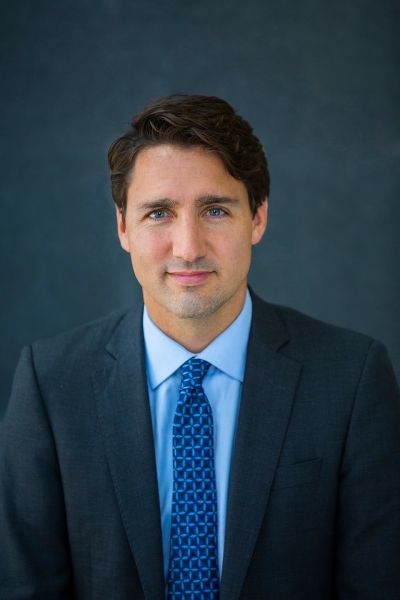
It is with great pleasure that I extend my warmest greetings to the readers of the magazine La Scena Musicale on its 20th anniversary.
La Scena Musicale is a Canadian classical music and arts reference that promotes culture admirably in both official languages. This publication looks at musical and artistic current affairs through an expert lens, presenting quality articles and analyses for its audience’s reading pleasure. I would like to congratulate all those associated with La Scena Musicale for their remarkable work. With wisdom and precision, you communicate your passion for classical music in all its diversity, thereby contributing to the enrichment of Canada’s cultural scene.
On behalf of the Government of Canada, I offer you my best wishes for a most memorable anniversary and for every success in the future.
We don’t see many UK or European leaders tipping their hat to classical music media, do we?
Arthur Magnus, grandson of the late conductor Nikolaus Harnoncourt, was buried on Friday in his home village, St. Georgen im Attergau, in Upper Austria.
An entertainment entrepreneur, Arthur was found dead on November 4 beneath the Williamsburg Bridge in New York, having apparently fallen while trying to climb the bridge.
We understand from eyewitnesses that he attended a wedding the previous evening in which guests were asked to wear fancy-dress costume. Arthur went as a character from Clockwork Orange. He appeared happy and normal at the wedding. Where he went afterwards is unknown.
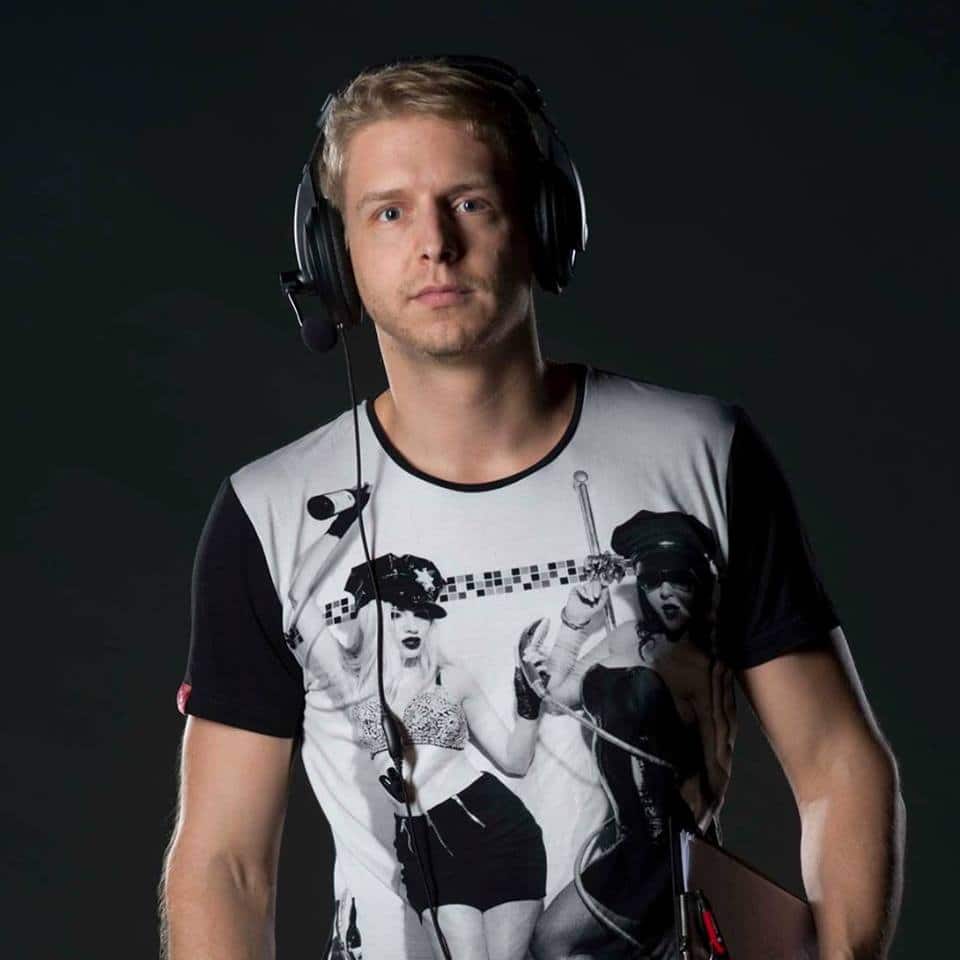
His son, Adam, writes:
My sister and I just buried my father in Montreal. With only immediate family and a few lifelong friends present, he was lowered into the ground in an unadorned pine box, next to his mother and father. Exactly as he’d asked. As I write this I’m thinking of my father’s unique blend of self-deprecation and dignity, his approachable elegance, his charisma without audacity, his old-world gentlemanliness and the hand-forged tower of his work.
There’s so much I wish I could thank him for, just one last time. I’d thank him for the comfort he always provided, for the wisdom he dispensed, for the marathon conversations, for his dazzling wit and humor. I’d thank him for giving me, and teaching me to love Montreal and Greece. And I’d thank him for music; first for his music which seduced me as a boy, then for his encouragement of my own music, and finally for the privilege of being able to make music with him. Thank you for your kind messages, for the outpouring of sympathy and for your love of my father.
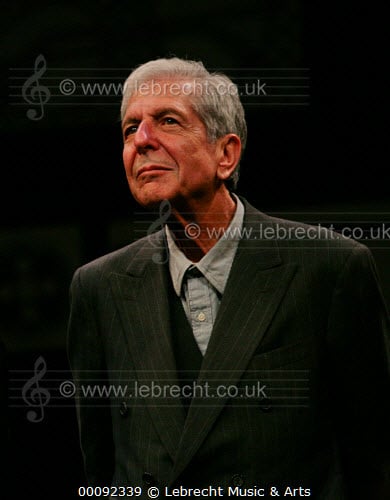
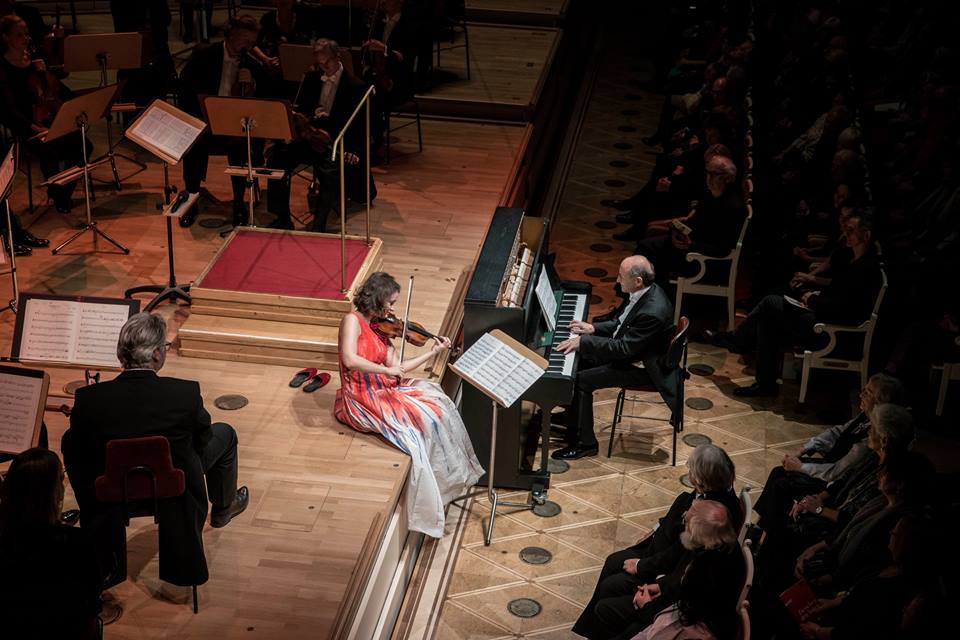
This is Patricia Kopatchinskaya in the Konzarthaus Berlin last night. After playing the Schumann concerto, she offered as an encore a new suite written by the conductor Ivan Fischer – and from an unexpected position.
The audience seem happy. Ivan certainly was.
(Right-click on picture to enlarge)
The darkest symphony in the canon – that’s what the Baltimore Symphony conductor thinks America needs to hear right now:
Today, as we have become immune to shock, where nothing seems too extreme and where hyperbole rules, Mahler and his Sixth Symphony seem to fit right in…
In the Sixth, Mahler seems to be searching for meaning in a rapidly changing, complex world while worrying about potential annihilation by fanatical forces. Sound familiar?
Read on here.
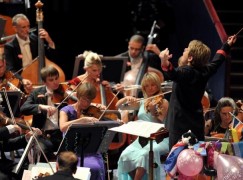
Soprano Joanne Burrow could not bear to leave her Yorkshire terrier at home.
So she got permission from producer Ellen Kent to walk the recovered stray through her role.
Puts a twist in the tail of La Bow-hème.
An opera by Poochini.
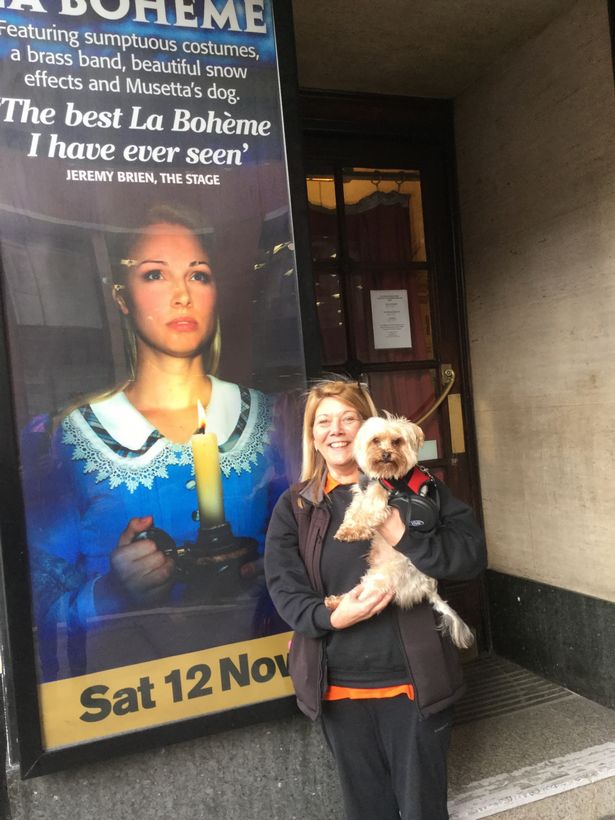
More here.
The death has been announced of Sir Ralph Kohn, a pharmaceutical manufacturer who, among many other causes, financed John Eliot Gardiner’s Bach Cantata series.
An enthusiastic baritone, he released recordings of Schubert and Schumann Lieder, accompanied by Graham Johnson.
He was an Honorary Fellow of the Royal Academy of Music and chairman of the Wigmore Hall International Song Competition.
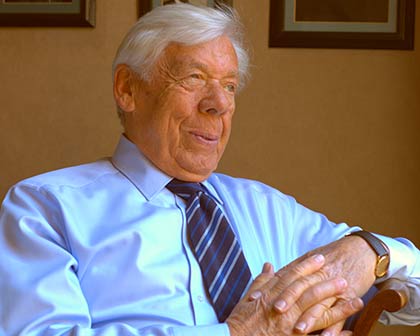
Nico Segal, who used to appear as ‘Donnie Trumpet’, will appear in future under his own name because he does not want to be associated with the tone of the president-elect.
Nico writes:
We just came off the release of Coloring Book and The Magnificent Coloring World Tour, both huge successes. But all during the tour, something heavy was looming over me — Donald Trump — and the connection people are drawing between his name and mine.
What began as a joke, a silly play on words, is not funny anymore. I don’t want to be connected to Trump’s hateful tone or his hurtful message. I don’t want to be misrepresented or misunderstood. Trump’s beliefs are not mine.
From this point on, call me Nico. I am proud to be part of a multicultural family, from the great City of Chicago. I am grateful for the diversity of friends and family who have taught me and believed in me and encouraged me. I couldn’t stand to ever hurt them, or you.
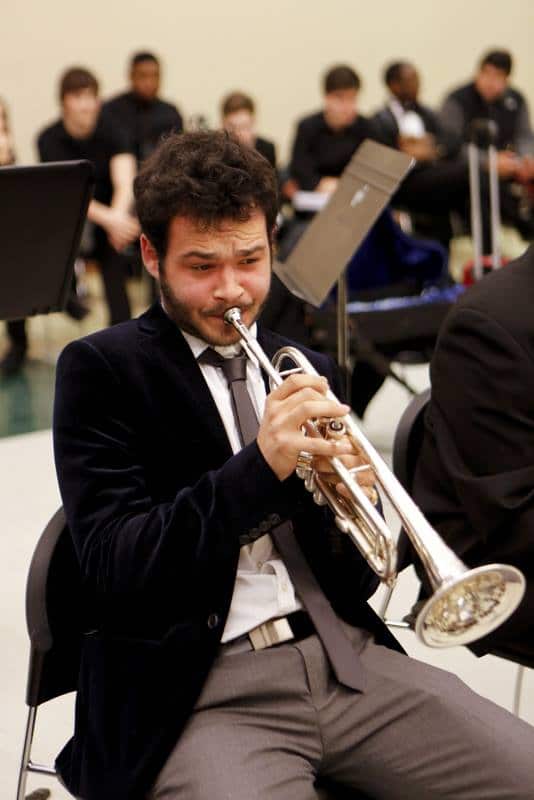
This could become a trend. Orchestras will soon be advertising for 2nd principal ****pet.
It is reported that two members of the group who performed on the night of the Bataclan massacre were denied entry at the reopening of the Paris venue last night.
One of the band, Jesse Hughes, had accused Bataclan staff of aiding the suicide gang. His partner was also exlcuded.
‘They came, I threw them out — there are things you can’t forgive,’ Bataclan boss Jules Frutos told Agence France-Presse.
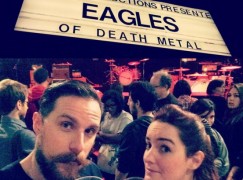
Erich Röhn was concertmaster of the Berlin Philharmonic during the Second World War and of the NDR symphony orchestra in Hamburg from 1945 to 1974. As Furtwängler’s soloist on January 12, 1944, he played the most ominous account of the Beethoven violin concerto that it is possible to imagine. It turned out to be the last concert in the old Philharmonie before it was flattened by British bombers on January 30, 1944.
Erich Röhn’s role model was Fritz Kreisler, composer of the most-used cadenza for the Beethoven concerto. Kreisler had been forced to leave Germany under the racial laws – but not before he gave the young man two vital (non-Beethoven) tips, as his grandson Daniel Röhn tells slippedisc.com:
Two tips that came my way via my grandfather have been particularly helpful. One thing Kreisler did when he played was to turn over the left revers of his jacket to help support the hold of his instrument. No-one else has ever suggested it to me, but it has been useful to know and something that I have done on more than one occasion.
Also, in a conversation after a concert in America, Kreisler told my grandfather ‘I can never practice the piece I am about to play in concert the same day. It has to be somewhat new to me. If I practice it too much, I can’t play it.’
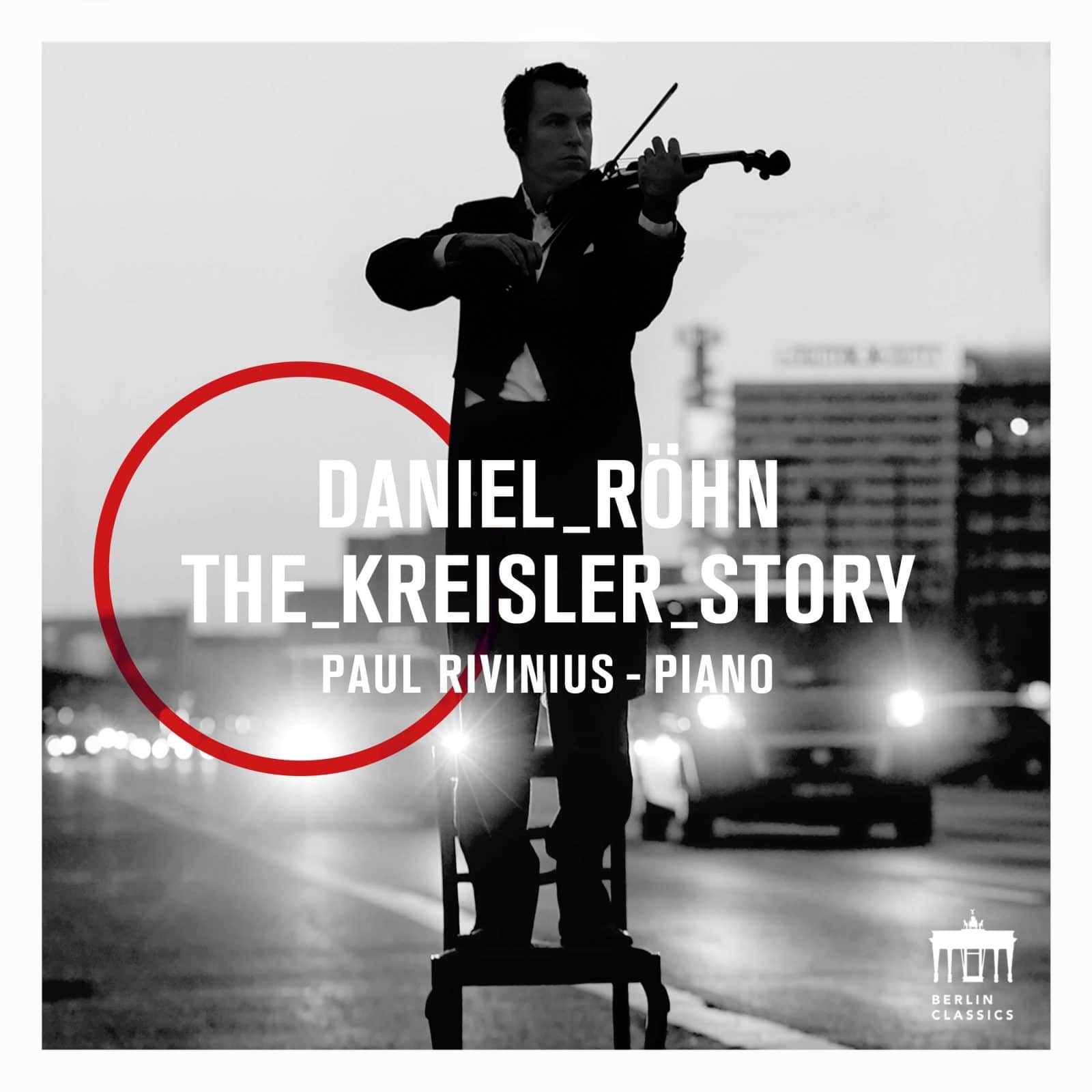
Daniel, an international soloist, has a new release, The Kreisler Story, out this month on Berlin Classics.
From the Lebrecht Album of the Week:
If the print on this review goes blurry on your screen it’s because I’m still rubbing my eyes at the cast list on this astonishing trove of archive finds, unobtainable anywhere on line. The composer Dmitri Shostakovich was a capable pianist who sometimes participated in his own premieres. The people he played with were the elite of Russian music….
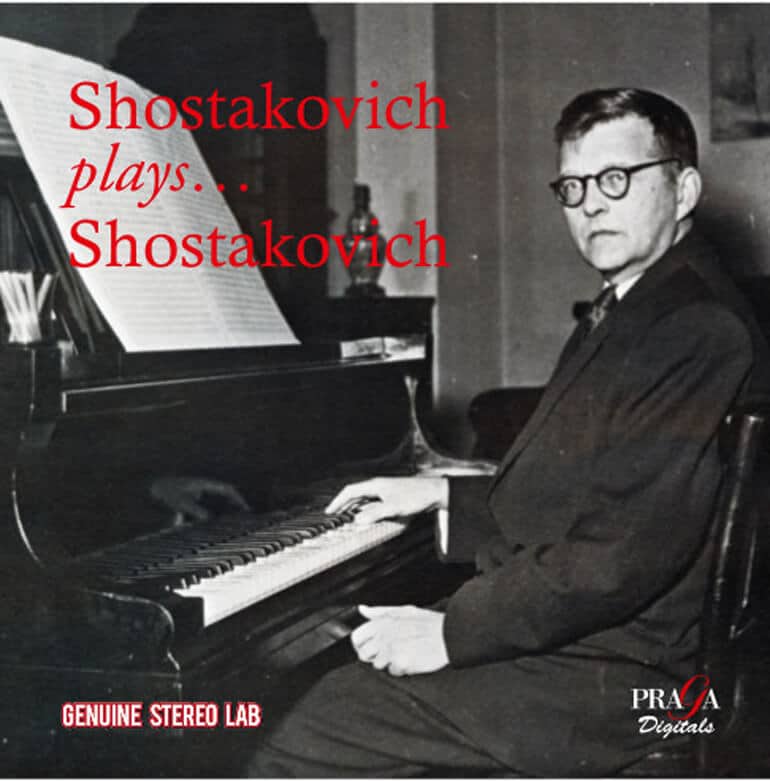
Read on here.
And here.